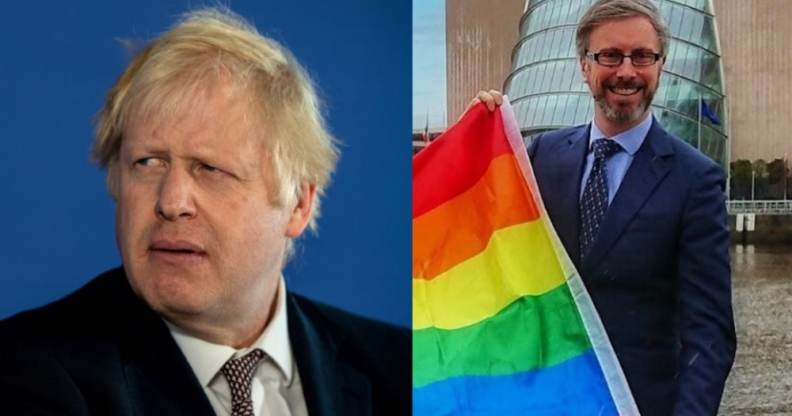Tory government is trying to ‘curry favour’ with anti-trans groups, says Irish minister

Boris Johnson’s government was criticised by Roderic O’Gorman for its handling of conversion therapy. (Getty/Facebook)
Ireland will ban conversion therapy for all LGBTQ+ people and will swerve the UK’s approach of excluding trans people, a government minister has said.
Roderic O’Gorman, minister for children and equality, said the government intends to ban the practice, and that the legislation will “leave no one behind”.
Speaking at an event hosted by Dublin LGBTQ Pride on Friday (13 May), O’Gorman said he expects the issue to become a “lightning rod” in Ireland, with some already gearing up to “narrow the fight down onto the trans issue”.
His department has commissioned qualitative research into conversion therapy so they have a firm foundation for bringing forward legislation, O’Gorman explained.
“As far as I’m concerned [the goal is] to ban conversion therapy for all,” the minister said.
“I certainly think there’s no way you can logically make the distinction that’s been made over in the UK. I think that’s a political distinction to avoid a fight – no, worse than that, it’s to curry favour with a particular group. So that’s certainly not the approach we’re going to take.”
Adam Long from the National LGBT Federation added: “What I would say is that we should look at what’s happening in Westminster at the moment and do the very opposite because it’s absolutely appalling the way that the government in Britain is treating LGBT+ issues in general, but particularly on trans rights.”
‘No place’ for conversion therapy in Ireland
Speaking at a separate event organised by LGBT Ireland on Tuesday (17 May), O’Gorman once again reaffirmed his commitment to outlaw conversion therapy for the entire LGBTQ+ community.
The minister said he had met with people who had first hand experience of undergoing conversion therapy.
“During those conversations they imparted stories of attempts to change the very core of their being, change the very core of their identity, and for some that has left a long lasting stigma,” O’Gorman said, according to The Irish Times.
“These practices are cruel, they are furtive, and they are rooted in the promotion of shame. There can be no place for them in our country.
“They are difficult conversations, people retracing their experiences, but I found them incredibly valuable as it strengthens my position to go into the Houses of the Oireachtas and argue for this vital legislation.”
O’Gorman went on to say that the legislation needs to be backed up by research to ensure it’s “watertight” as some politicians will likely try to derail legislation with “other agendas”.
According to the Irish Independent, the legislation will also factor in instances where people are removed from the country to undergo conversion practices.
It is understood that the research underpinning the legislation is likely to be completed before the end of the summer. Researchers at Trinity College Dublin have been tasked with compiling first hand experiences of the practice, which has been condemned by almost every mainstream psychiatric body.
Shortly after the LGBT Ireland event, O’Gorman tweeted: “A ban on conversion practices will happen, and it will leave no one behind.”
At @LGBT_ie’s event on #IDAHOBIT2022, I announced that we have begun research into the cruel practice of so-called conversion therapy, which will pave the way for legislation.
A ban on conversion practices will happen, and it will leave no one behind. 🏳️🌈🏳️⚧️ pic.twitter.com/RY7Lj8zGaU
— Roderic O’Gorman TD (@rodericogorman) May 17, 2022
In April, Downing Street faced resounding criticism from LGBTQ+ rights organisations when it announced that it would push ahead with a trans-exclusionary conversion therapy ban.
It has been almost four years since the UK government first committed to outlawing the practice, but ministers have repeatedly kicked the can down the road in the face of mounting backlash from anti-trans campaigners.
LGBT Ireland pledged at the time to work with the Irish government to ensure trans people would be included in a ban in the country.
The UK government has since confirmed that “consenting adults” will also not be protected when its legislation is brought forward. Activists have repeatedly warned against such a move, arguing that it’s not possible to consent to traumatic and torturous practices.

